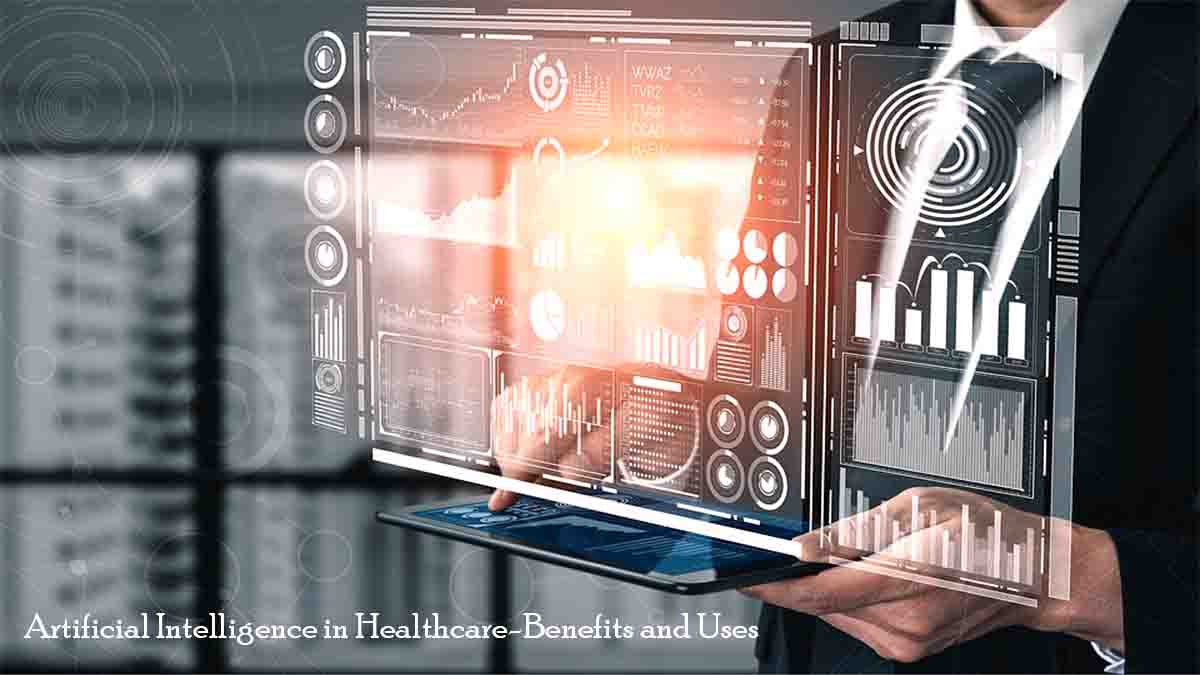Artificial intelligence (AI) is, rapidly transforming healthcare and revolutionizing the way medical professionals diagnose, treat, and manage diseases. As one of the most promising technologies of our time, AI offers numerous benefits to healthcare, including greater accuracy, efficiency, and accessibility.
This article explores the different ways in which AI is, being used in healthcare, examines the benefits of its applications, and discusses the future potential of AI in this critical sector.
The Evolution of AI in Healthcare

The journey of AI in healthcare began decades ago with the development of simple algorithms for data analysis. However, the explosion of big data, advances in machine learning, and the availability of powerful computing resources have accelerated the evolution of AI.
Today, AI encompasses a wide range of technologies, including natural language processing (NLP), computer vision, deep learning, and robotics, all of which are making significant advances in the healthcare industry.
Key AI Technologies Transforming Healthcare
1. Machine Learning
Machine learning, a subset of artificial intelligence, involves training algorithms to learn from data and make predictions or decisions without the need for explicit programming. In healthcare, machine learning is, used for a variety of purposes, including predicting patient outcomes, identifying disease patterns, and personalizing treatment plans.
For example, machine learning algorithms can analyze large amounts of medical data, including electronic health records (EHRs), to identify patients at risk of developing chronic diseases such as diabetes or heart disease.
2. Natural Language Processing (NLP)
NLP enables computers to understand, interpret, and respond to human language. In healthcare, NLP is, used to analyze unstructured data in electronic health records, research articles, and clinical notes. By extracting valuable insights from this data, NLP helps healthcare professionals make informed decisions, improve patient care, and streamline administrative tasks.
For example, NLP can be used to identify patients with specific conditions, monitor the progression of a disease, or even detect early signs of mental health problems by analyzing patients’ communication patterns.
3. Computer Vision
Computer vision, another subset of AI, involves teaching computers to interpret and analyze visual information from the world, such as images and videos. In healthcare, computer vision is, used in diagnostic imaging, enabling automatic detection of abnormalities in X-rays, MRIs, and CT scans.
This technology can significantly improve diagnostic accuracy, help radiologists identify diseases earlier, and reduce the time needed to analyze images. For example, AI-based computer vision systems can detect tumors, fractures, and other conditions with a high degree of accuracy, often beyond human capabilities.
4. Robotics
Robotics in healthcare has been revolutionized by artificial intelligence, leading to the development of surgical robots, rehabilitation robots, and assistive devices for patients with disabilities. AI-powered surgical robots, such as the da Vinci Surgical System, allow surgeons to perform minimally invasive procedures with greater precision and control. These robots can analyze data in real time during surgery, adjust their movements accordingly, and give surgeons better visualization of the surgical site. Additionally, AI-powered rehabilitation robots help patients recover from injuries by providing personalized therapies and monitoring progress.
The Benefits of AI in Healthcare
1. Improved Diagnostics
One of the most important benefits of AI in healthcare is, its ability to improve the accuracy of diagnoses. AI algorithms can analyze large amounts of medical data, including images, lab results, and patient histories, to identify patterns that human doctors might miss. For example, AI systems have been developed to detect early signs of diseases such as cancer, Alzheimer’s, and cardiovascular disease, often with greater accuracy than traditional methods.
The diagnostic capabilities of AI go beyond imaging. In pathology, AI can analyze tissue samples to identify abnormalities, such as cancer cells, with high accuracy. This reduces the likelihood of misdiagnosis and ensures that patients receive timely and appropriate treatment. Additionally, AI-based diagnostic tools can provide a second opinion, reducing variability in diagnoses and increasing overall confidence in clinical decision-making.
2. Personalized Medicine
Personalized medicine is, an emerging field that tailors medical treatment to the individual characteristics of each patient. Artificial intelligence plays a crucial role in this approach by analyzing genetic, environmental, and lifestyle data to predict how patients will respond to specific treatments. For example, AI can identify which cancer therapies are most likely to be effective for a particular patient based on their genetic profile, leading to more targeted and effective treatments.
AI-based personalized medicine also extends to drug discovery and development. By analyzing large amounts of genetic information and clinical trial results, AI can identify potential drug candidates, predict their effectiveness, and even suggest optimal dosing strategies. This speeds up the drug development process, reduces costs, and increases the likelihood of developing successful therapies.
3. Better Patient Care
AI is, transforming patient care by enabling more proactive, personalized, and efficient healthcare delivery. For example, AI-powered virtual health assistants can monitor patients’ vital signs, remind them to take their medications, and provide health advice based on real-time data. These virtual assistants can also facilitate remote consultations, allowing patients to receive care without the need for in-person visits. In hospitals, AI is, being used to optimize patient flow, ensuring that resources are allocated efficiently and that patients receive timely care. AI algorithms can predict patient admissions, discharges, and the need for specific interventions, helping healthcare providers manage their workloads more effectively. Additionally, AI-based predictive analytics can identify patients at risk of developing complications, enabling early intervention and reducing hospital readmissions.
4. Drug Discovery and Development
The process of discovering and developing new drugs is, expensive and time-consuming, often taking years and costing billions of dollars. Artificial intelligence is, revolutionizing this process by accelerating the identification of potential drug candidates and predicting their efficacy. Machine learning algorithms can analyze large amounts of biological and chemical data to identify compounds that may be effective against specific diseases.
AI also plays a crucial role in clinical trials, where it can be used to identify eligible participants, predict patient outcomes, and monitor trial progress in real time. This reduces the time and cost associated with bringing new drugs to market and increases the likelihood of positive outcomes. Additionally, AI can help repurpose existing drugs for new uses, identifying potential treatments for previously incurable diseases.
5. Operational Efficiency
AI is, improving operational efficiency in healthcare by automating administrative tasks, optimizing resource allocation, and improving decision-making. For example, AI-based scheduling systems can manage appointments, ensuring that healthcare workers’ time is, used effectively and that patients receive timely care. Similarly, AI algorithms can predict patient demand for specific services, allowing hospitals to allocate staff and resources more efficiently.
AI is, also being used to streamline billing and coding processes, reducing the administrative burden on healthcare providers and minimizing the risk of errors. By automating these tasks, AI frees up valuable time for clinicians, allowing them to focus on patient care. Additionally, AI-based analytics can identify inefficiencies in healthcare delivery, enabling organizations to make data-driven decisions that improve overall performance.
6. Predictive analytics
Predictive analytics is, a powerful application of AI that allows healthcare providers to anticipate future events and take proactive steps to improve patient outcomes. By analyzing historical data, AI algorithms can predict the likelihood of patients developing specific conditions, such as heart disease or diabetes, and recommend preventative measures.
For example, AI-based predictive analytics can identify patients at risk of readmission after surgery, allowing healthcare providers to implement interventions that reduce this risk. Similarly, AI can predict disease outbreaks by analyzing data from various sources, such as social media, weather patterns, and travel data. This allows public health authorities to take preventative measures, such as distributing vaccines or issuing travel advisories, to mitigate the impact of potential outbreaks.
AI Applications in Healthcare
1. medical imaging
The impact of AI on medical imaging is, profound, with numerous applications that improve the accuracy and efficiency of diagnoses. AI-based systems can analyze medical images, such as X-rays, MRIs, and CT scans, to detect abnormalities such as tumors, fractures, and infections. These systems can provide real-time information to radiologists, highlighting problem areas and suggesting potential diagnoses.
One of the most significant advantages of AI in diagnostic imaging is, its ability to detect conditions at an early stage, often before symptoms become apparent. For example, AI algorithms can identify early signs of lung cancer in CT scans, enabling earlier treatment and improving patient outcomes. Additionally, AI-based imaging systems can reduce the time it takes to analyze images, freeing radiologists to focus on more complex cases and increasing overall efficiency.
2. Virtual Health Assistants
Virtual health assistants are AI-based tools that provide personalized health advice, monitor patient conditions, and facilitate communication between patients and healthcare providers. These assistants can interact with patients via voice or text, answering questions, providing reminders, and offering healthcare advice based on individual needs.
For example, virtual health assistants can monitor chronic conditions, such as diabetes or hypertension, by monitoring patients’ vital signs and providing real-time feedback. If a patient’s health condition worsens, the assistant can alert healthcare providers, allowing for timely intervention. Additionally, virtual health assistants can help patients manage their medications, ensuring they take the right doses at the right time and reducing the risk of adverse effects.
3. Precision Medicine
Precision medicine aims to adapt medical treatment to the individual characteristics of each patient, taking into account factors such as genetics, environment and lifestyle. Artificial intelligence plays a crucial role in this approach, analyzing large data sets to identify patterns and predict how patients will respond to specific treatments.
For example, AI algorithms can analyze genetic data to identify mutations associated with certain types of cancer, allowing oncologists to select specific therapies that are more likely to be effective. Similarly, AI can predict how patients will respond to specific medications, reducing the risk of adverse reactions and improving overall treatment outcomes.
4. Remote Monitoring
Remote monitoring is, a rapidly growing area of healthcare, enabled by AI-powered devices and sensors that monitor patient conditions in real time. These devices can monitor vital signs, such as heart rate, blood pressure, and glucose levels, and transmit the data to healthcare providers for analysis.
AI algorithms can analyze this data to detect changes in patients’ conditions, allowing healthcare providers to intervene before complications occur. For example, remote monitoring devices can detect early signs of heart failure, allowing timely adjustments to treatment plans and reducing the risk of hospitalization.
Remote monitoring also allows patients to receive care from the comfort of their own homes, reducing the need for frequent in-person visits and improving their overall quality of life.
5. AI-Powered Surgery
AI is, revolutionizing surgery by enabling more precise and minimally invasive procedures. AI-powered surgical robots, such as the da Vinci Surgical System, allow surgeons to perform complex procedures with greater precision and control. These robots can analyze data in real time during surgery, adjust their movements accordingly, and give surgeons better visualization of the surgical site.
For example, AI-powered robots can help with procedures like prostate surgery, where precision is, essential to preserve nerve function and reduce the risk of complications. AI can also be used to plan surgeries, predict potential complications, and suggest optimal surgical approaches based on individual patient data.
6. Drug Discovery
AI is, transforming drug discovery by accelerating the identification of potential drug candidates and predicting their efficacy. Traditional drug discovery methods are expensive and time-consuming, often taking years and costing billions of dollars. AI can streamline this process by analyzing large data sets of genetic information, chemical structures, and clinical trial results to identify compounds that may be effective against specific diseases.
For example, AI algorithms can analyze genetic data to identify potential targets for drug development, such as specific proteins associated with disease progression. These algorithms can predict how different compounds will interact with these targets, allowing researchers to prioritize the most promising candidates for further testing. Additionally, AI can be used to repurpose existing drugs for new uses, identifying potential treatments for previously incurable diseases.
Challenges and ethical considerations
While AI offers numerous benefits to the healthcare industry, its widespread adoption also poses several challenges and ethical considerations that must be addressed.
1. Data Privacy and Security
One of the most important challenges associated with AI in healthcare is, ensuring the privacy and security of patient data. AI systems rely on large amounts of data to function effectively, and this data often includes sensitive information such as medical records and genetic data. Ensuring that this data is, protected from unauthorized access is, critical to maintaining patient trust and complying with regulations such as the Health Insurance Portability and Accountability Act (HIPAA).
To address these concerns, healthcare organizations must implement strong data security measures, such as encryption, access controls, and regular security audits. Additionally, AI systems should be designed to minimize the amount of data collected and stored, reducing the risk of data breaches.
2. Bias in AI Algorithms
AI algorithms are only as good as the data they are trained on, and if that data is, biased, the algorithms can produce biased results. In healthcare, this can lead to disparities in treatment and outcomes, especially for underrepresented populations.
For example, if an AI algorithm is, trained on data from primarily white patients, it may not perform as well with patients of other ethnicities, leading to inaccurate diagnoses or suboptimal treatment recommendations. To mitigate bias in AI algorithms, it is, essential to ensure that training data is, diverse and representative of the patient populations the algorithms will serve. Additionally, AI systems should be periodically evaluated for bias, and steps should be taken to address any identified disparities.
3. Regulatory Challenges
The rapid pace of development of AI in healthcare has outpaced regulatory frameworks, creating uncertainty about how AI technologies should be evaluated and approved for use. Ensuring that AI systems meet high standards of safety and efficacy is, critical to their successful adoption in healthcare.
Regulatory bodies, such as the U.S. Food and Drug Administration (FDA), are working to develop guidelines for approving AI-based medical devices and algorithms. These guidelines should be flexible enough to adapt to the rapidly evolving AI technology, while ensuring that patient safety is, not compromised.
4. Impact on healthcare workers
The adoption of AI in healthcare raises concerns about its impact on the workforce. While AI has the potential to improve efficiency and reduce administrative burdens for healthcare workers, there are concerns that it could also lead to job displacement, particularly in positions that involve routine tasks.
However, AI is, more likely to complement the work of healthcare professionals rather than replace them. By automating routine tasks, AI frees up doctors to focus on more complex, patient-centric tasks, such as diagnosis, treatment planning, and patient communication. Additionally, AI can provide healthcare providers with valuable insights and decision support, improving their ability to provide high-quality care.
5. Ethical Considerations in AI-Based Decision Making
AI-based decision making in healthcare raises several ethical considerations, particularly when it comes to the use of AI in life-or-death situations. For example, if an AI algorithm is, used to prioritize patients for organ transplants, its decision-making process must be transparent and fair. Ensuring that AI systems are used ethically requires careful consideration of the principles of autonomy, beneficence, non-maleficence, and justice.
To address these issues, healthcare organizations must establish ethical guidelines for the use of AI, ensuring that patient well-being is, always the primary consideration. Additionally, AI systems must be designed to be transparent and explainable, allowing healthcare professionals and patients to understand how decisions are made.
The Future of AI in Healthcare
The future of AI in healthcare is, promising, and continued advances in the technology are expected to drive further innovation and transformation. As AI becomes more integrated into healthcare systems, we can expect to see new applications and use cases emerge that improve patient outcomes and increase efficiency.
1. AI-Powered Precision Medicine
Precision medicine is, likely to be one of the fastest-growing areas for AI in healthcare. As more data becomes available, AI algorithms will become increasingly accurate at predicting patient responses to treatment, enabling more personalized and effective care.
Additionally, advances in genomics and AI-based drug discovery are expected to lead to the development of novel therapies targeting specific genetic mutations and disease pathways.
2. Artificial Intelligence in Mental Health
Artificial intelligence is, poised to play a major role in mental health care, particularly in the early diagnosis and treatment of mental disorders. AI-powered tools can analyze language patterns, social media activity, and other data to identify early signs of depression, anxiety, and other mental health issues.
These tools can provide real-time feedback to patients and healthcare providers, enabling early intervention and improving outcomes.
3. AI-Powered Remote Monitoring and Telemedicine
The COVID-19 pandemic has accelerated the adoption of telemedicine, and AI is, expected to play a critical role in the continued growth of remote healthcare. AI-powered remote monitoring devices and virtual health assistants will enable patients to receive high-quality care from the comfort of their homes, reducing the need for in-person visits and improving access to healthcare services.
Additionally, AI-powered telemedicine platforms can analyze patient data in real time, providing healthcare providers with valuable insights and decision support. This will enable more accurate diagnoses, personalized treatment plans, and better patient outcomes.
4. Artificial Intelligence in Public Health
Artificial intelligence has the potential to revolutionize public health by enabling more effective disease surveillance, epidemic forecasting, and resource allocation. AI algorithms can analyze data from various sources, such as social media, weather patterns, and travel data, to identify potential disease outbreaks and predict their spread.
This allows public health authorities to take proactive measures, such as distributing vaccines or issuing travel advisories, to mitigate the impact of outbreaks. Additionally, AI can be used to optimize the distribution of healthcare resources, such as vaccines, drugs, and medical equipment, ensuring they are allocated where they are most needed.
Conclusion
AI is, profoundly transforming healthcare and offers numerous benefits, including better diagnostics, personalized medicine, improved patient care, and greater operational efficiency. As AI continues to evolve, its applications in healthcare will expand, driving greater innovation and improving patient outcomes.
However, the widespread adoption of AI also raises several challenges and ethical considerations that must be addressed, including data privacy, bias, regulatory challenges, and the impact on healthcare providers. The future of AI in healthcare is, bright, and continued technological advances are expected to drive further innovation and transformation. By harnessing the power of AI, healthcare providers can deliver more personalized, efficient, and effective care, ultimately improving the health and well-being of patients around the world. #AI, #Chatbots, #CustomerService


